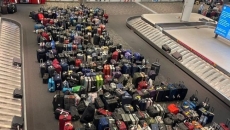VANCOUVER - A union representing thousands of provincial government workers in British Columbia has escalated job action with a ban on overtime.
B.C. General Employees' Union president Stephanie Smith says in a statement the public service has relied on overtime for far too long.
With no cost-of-living adjustments, @bcgeu workers are taking a pay cut they can't afford.
— Beatrice Bruske, CLC President (@PresidentCLC) August 22, 2022
Standing in #solidarity in their fight for wage protections, along with @HospEmpUnion, @cupenat, @ILWUCanada, @SeafarersUnion @MoveUPTogether #canlab #cdnpoli #bclab #bcpoli pic.twitter.com/DKx6aUONTQ
She says the aim is to deal with some systemic issues behind that reliance and to push the government to negotiate a contract after the union issued a 72-hour strike notice on Aug. 12.
The ban will not apply to members working in the BC Wildfire Service during the current wildfire season.
Last week, the 33,000-member union set up pickets around liquor distribution outlets to back demands like wage protection against inflation.
That has prompted the province to limit alcohol sales to no more than three of any individual item per customer, per day, at BC Liquor Stores, though beer purchases are exempt.
"We need wage increases that stop our members falling into debt every month because we've done internal polling and about 50 per cent of them are saying they are going further into debt just to meet their basic needs," Smith said in an interview.
"Politicians of all stripes in Victoria have a cost-of-living adjustment built into their wages, so their wages have been tied to rates of inflation since 2007. Minimum wage in this province is now finally tied to rates of inflation. Anything that doesn't do that is essentially a wage cut."
Smith said the BCGEU started bargaining in February but talks broke off after an "insulting" wage offer, followed by nearly 95 per cent of members voting in favour of job action in June.
The union's opening proposal called for a five per cent wage hike annually as part of a three-year contract, or a cost-of-living adjustment, whichever was greater.
Smith said all members are being asked to refuse overtime, unless an excluded manager declares an emergency.
She said the union also wants better mental health supports for workers, some of whom experienced abuse on the job from the public as COVID-19 precautions like masking were ramped up.
"We know we're going to be seeing the repercussions of that level of stress and that level of anxiety for a long time."
Employees who worked in offices of the Children's Ministry and the Ministry of Social Development and Poverty Reduction were among those who faced the highest levels of backlash, Smith said.
The BC Public Service Agency did not immediately respond to a request for comment.






